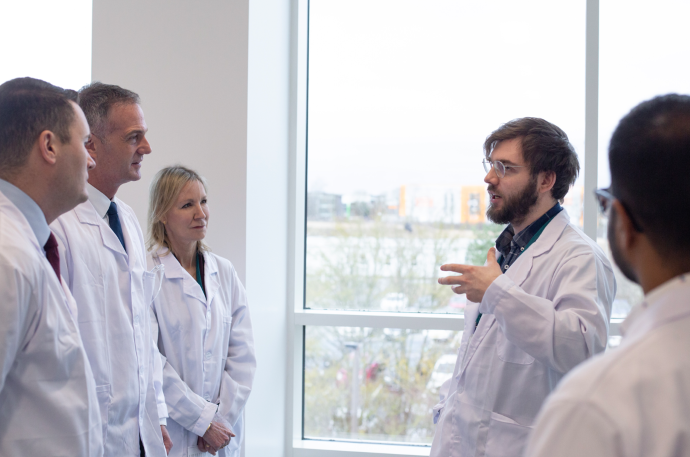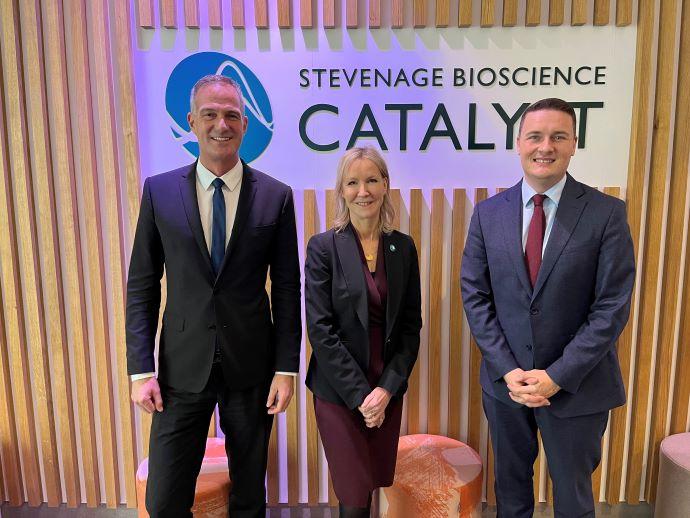he campus at Gunnels Wood Road hosts one of GSK’s two main global research and development facilities, the Cell and Gene Therapy Catapult Manufacturing Centre and Stevenage Bioscience Catalyst, a leading UK location for start-ups and established companies to develop and commercialise cutting edge therapeutics. This co-location of R&D and manufacturing facilities is unique within the Golden Research Triangle of Oxford-Cambridge-London. This enables companies to move from start-up to scale up and the commercialisation of potentially life-saving therapeutics.
In 2020, the Stevenage campus was awarded Life Sciences Opportunity Zone status by the Government and High Potential Opportunity status for its excellence in cell and gene therapy by the Department for Business and Trade. It is now a leading life science cluster with a world-recognised specialism in cell and gene therapy.(1)
The Shadow Ministers were greeted by Stevenage Bioscience Catalyst CEO Dr Sally Ann Forsyth OBE who led them on a tour of SBC’s facilities. SBC is home to over 40 companies, which since opening in 2011, have raised over £3bn in funding, with Stevenage, a relative newcomer, now on a par for equity raised on biotechnology (2017-2020) with the more established life science clusters of Oxford, Cambridge, and London.(2)
Early-stage innovation is nurtured at SBC’s Lab Hotel which provides fledgling start-ups with rent-free space for six months. Wes Streeting and Peter Kyle met with the CEOs of three current Lab Hotel occupiers: Genevation which is developing anti-cancer vaccines; Vasodynamics, which is helping patients with the side effects from chemotherapy and Plurify which is advancing cell and gene therapy for a range of future treatments. They also met with Complement Therapeutics which successfully raised over €72million funding in 2023 to help tackle vision loss in older people and other eye conditions.
Following the tour, the Labour Ministers took part in a roundtable discussion with leaders from SBC, AstraZeneca, GSK, BioIndustry Association (BIA) together with two of SBC’s high growth companies Complement Therapeutics and Autifony Therapeutics to discuss some of the biggest opportunities and challenges facing the sector. This provided Labour with valuable feedback on their plans to support the sector’s start-ups, scale-ups, and established companies. Labour has announced that if elected it would increase investment in research and development in the pharmaceutical sector by £10bn a year. The focus will be on the development of next generation medical treatments such as cell and gene therapy, mRNA vaccines and the use of AI in healthcare – all very much in evidence today at SBC.

Dr Sally Ann Forsyth OBE, said:
“The fact that Labour chose to launch their Life Sciences Strategy here in Stevenage demonstrates that the innovation happening on campus is powering the UK economy and the next generation of healthcare. This was a great opportunity to showcase some of the fantastic science taking place at SBC and also to have a frank and open conversation about the challenges facing our sector.
Peter Kyle, Shadow Secretary of State for Science, Innovation and Technology, said:
“If we get this right, we can transform the NHS so that it becomes an engine of innovation, a driver of growth and a public service that once again delivers world class outcomes for patients. Labour will work hand in glove with life sciences companies to tackle the biggest killers, reduce the number of lives lost to heart disease, stroke and cancer and create thousands of new jobs across the country.”
Wes Streeting, Shadow Secretary of State for Health and Social Care, said:
“The life sciences are key to our mission for an NHS fit for the future and pioneering breakthroughs that will transform and extend lives for the better. […] This plan will ensure that NHS patients get better care and that more life-saving medicines are developed right here in the UK to help people live better lives.”
Steve Bates OBE, CEO of the BioIndustry Association, said:
“Innovative small companies are the innovation drivers for the life sciences industry and facilities like Stevenage Bioscience Catalyst provide them with valuable support on their scaling journey. The plans set out by Labour today will help ensure sites like this can continue to deliver economic growth for their local communities and innovative medicines for the world.”



